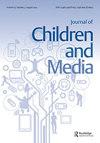Parent viewership of 13 reasons why and parental perceived knowledge about adolescent life: implications for parental efficacy among parents from the United States, the United Kingdom, Brazil, and Australia/New Zealand
IF 2.1
3区 心理学
Q2 COMMUNICATION
引用次数: 0
Abstract
ABSTRACT There has been a recent increase in television programming that aims to provide realistic portrayals of adolescent life in an effort to both entertain and educate adolescent viewers. Research on this entertainment-education programming has examined the effects on adolescent viewers; however, it has not considered the relationship between parent viewing of such programming and their perceived knowledge about adolescent life. Further, it is possible that parent viewing of entertainment-education programming can relate to parental efficacy indirectly via their perceived knowledge about adolescent life. We test these relationships using data from 1,880 parent viewers and non-viewers (adolescent children ages 13–17) of the series 13 Reasons Why sampled from Brazil, Australia/New Zealand, the United States, and the United Kingdom. Results suggest an indirect relationship between parent viewership of the series and parental efficacy, via parental perceived knowledge, among parents who viewed the entire first season in comparison to those who only viewed some episodes. There were direct relationships between viewing and parental efficacy when comparing those who viewed all episodes to non-viewing parents. These findings suggest that entertainment-education programming may relate to positive outcomes among parents, with implications for the family ecology. IMPACT SUMMARY a. Prior State of Knowledge: The genre of entertainment-education programming (EE) includes programs that provide realistic portrayals of adolescent life including portrayals of sensitive topics. Prior examinations of adolescent-directed EE consider effects on adolescent viewers but do not consider the effect on parent viewers. b. Novel Contributions: Results suggest an indirect relationship between parent viewership of the Netflix produced series, 13 Reasons Why, and parental efficacy, via parental perceived knowledge. These findings occur among parents who viewed the entire first season of the series in four global regions. c. Practical Implications: These findings suggest that EE programming may relate to positive outcomes among parent viewers and have larger implications for the family ecology by bolstering parental efficacy and perceived knowledge about adolescent life.父母对青少年生活的13个原因的看法和父母对青少年生活的认知:美国、英国、巴西和澳大利亚/新西兰父母对父母效能的影响
最近,越来越多的电视节目旨在提供青少年生活的真实写照,以娱乐和教育青少年观众。对这种娱乐教育节目的研究考察了对青少年观众的影响;然而,它没有考虑到父母观看这类节目与他们对青少年生活的认知之间的关系。此外,父母观看娱乐教育节目可能通过他们对青少年生活的感知知识间接与父母效能相关。我们使用来自巴西、澳大利亚/新西兰、美国和英国的《十三个原因》系列的1,880名家长观众和非观众(13 - 17岁的青少年儿童)的数据来检验这些关系。研究结果表明,与只看了几集的父母相比,观看了整个第一季的父母与只看了几集的父母之间,通过父母感知知识,父母观看剧集和父母效能之间存在间接关系。当将观看所有剧集的父母与不看剧集的父母进行比较时,观看和父母效能之间存在直接关系。这些发现表明,娱乐教育节目可能与父母之间的积极结果有关,并对家庭生态产生影响。a.先前的知识状态:娱乐教育节目(EE)的类型包括对青少年生活的现实描绘,包括对敏感话题的描绘。先前对青少年定向情感表达的研究考虑了对青少年观众的影响,但没有考虑对家长观众的影响。b.新颖贡献:结果表明,通过父母感知知识,父母观看Netflix制作的电视剧《十三个原因》与父母效能之间存在间接关系。这些发现来自全球四个地区的家长,他们观看了该剧的整个第一季。c.实际意义:这些研究结果表明,情感表达节目可能与父母观众的积极结果有关,并且通过提高父母效能和对青少年生活的感知知识,对家庭生态有更大的影响。
本文章由计算机程序翻译,如有差异,请以英文原文为准。
求助全文
约1分钟内获得全文
求助全文

 求助内容:
求助内容: 应助结果提醒方式:
应助结果提醒方式:


